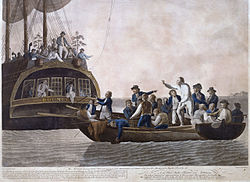
Back Метеж Bulgarian Motí Catalan Miwtini Welsh Mytteri Danish Meuterei in der Schifffahrt German Motín Spanish سرکشی Persian Mutinerie French Ceannairc Irish Pobuna Croatian

Mutiny is a revolt among a group of people (typically of a military or a crew) to oppose, change, or remove superiors or their orders. The term is commonly used for insubordination by members of the military against an officer or superior, but it can also sometimes mean any type of rebellion against any force. Mutiny does not necessarily need to refer to a military force and can describe a political, economic, or power structure in which subordinates defy superiors.
During the Age of Discovery, mutiny particularly meant open rebellion against a ship's captain. This occurred, for example, during Ferdinand Magellan's journeys around the world, resulting in the killing of one mutineer, the execution of another, and the marooning of others; on Henry Hudson's Discovery, resulting in Hudson and others being set adrift in a boat; and the famous mutiny on the Bounty.
Mutiny is widely considered a serious crime, punishable by imprisonment, penal labour or death. Failure to prevent or suppress a mutiny may also be punishable depending on the circumstances; negligent failure may result in dishonourable discharge while cowardly failure may bring any punishment including death.[1][2] The UK has passed various Mutiny Acts to establish procedure and punishment, the latest of which is the Armed Forces Act 2006. Miltary mutineers are usually tried at court martial, represented by counsel. Pirate captains have been known to mete out punishment ad hoc without due process.
- ^ "Naval Discipline Act 1860". UK National Archives. Retrieved 25 April 2025.
- ^ "10 U.S. Code § 894 - Art. 94. Mutiny or sedition". Cornell Law School. Retrieved 25 April 2025.
© MMXXIII Rich X Search. We shall prevail. All rights reserved. Rich X Search